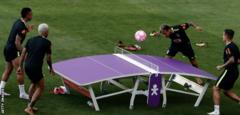Ronaldinho is a whizz, Neymar's a fan and the Chelsea team are at it in training most days.
It's table tennis, but not as you know it.
Teqball, best described as football played on a 'scientifically' adapted curved ping pong table, has attracted the interest of an ensemble of world-class footballers and the sport is now aiming for Olympic inclusion.
The problem is, the majority of people don't know it exists.
Until recently, football freestyler Ben Nuttall was one of them.
Now he is about to represent England at the World Cup in France.
"When I was at school, we'd set up a table and put bags in the middle to play header table tennis with a football," Nuttall told BBC Sport. "I didn't realise it was an actual sport until I got the call up."
The 18-year-old from Birmingham readily admits it wasn't something he was "insane at" when introduced to the game, but as someone who holds the Guinness World Record for keepy uppies with a rugby ball he adapted quickly.
"It is harder than it looks," he said.
"As a freestyler I already have the first touch control, balance and coordination. It took some getting used to and I had to learn the rules, but it's fun.
"I've seen videos of other players, some professionals who train every day, and the quality at the World Cup is going to be high."
How the teq do you play?
- The ball must be returned to the opponent's side onto the table by touching it a maximum of three times
- The ball cannot be touched by the same body part in succession
- Players win a point if the opponent fails to return the ball legally
- Matches are played as the best of three sets
- A set is won by the first side to win 20 points. The final set needs to be won by two clear points
- Points are scored in a number of ways
- The World Cup has both singles and doubles competitions - open to both men and women
Since the first World Cup last year, the tournament has doubled in size with more than 40 nations going for glory in the three-day event starting on Thursday in Reims.
While it has its own world championship, teqball got its biggest exposure when Brazil players, including Neymar, Coutinho, Dani Alves and Marcelo, were filmed playing against each other during training at the 2018 World Cup.
Brazil's former World Cup winner Ronaldinho has a table at home and has dazzled on the board in a number of videos.
While teqboard tables, which cost around £2,000, can be found at Premier League bases like Chelsea's Cobham training ground rather than at public parks and recreation halls, Nuttall said the sport has plenty of appeal.
"I can see that a lot of footballers see it as being good for training and improving their touch, but it could really grow if people start looking at it as a sport itself," he said.
"There is talk of the Olympics in the future. That would be great."
Last month teqball was officially recognised as a sport by the Olympic Council of Asia. In Britain there is a push to have national governing bodies established in England, Scotland, Wales and Northern Ireland.
The game and table design was created in Hungary by a former professional footballer who teamed up with a businessman and computer scientist.
Viktor Huszar, the scientist behind it, said it was the "peak of his football career" watching news reports which included footage of players using the table at the World Cup in Russia.
Huszar sees it as good business exposure and a "show of approval" from football royalty.
"Teqball is showing that there is a new model in the sports world, as all sports have so far been based on traditional conservative approaches," said Huszar.
"Sports that were created a hundred years ago didn't have the opportunities through the internet and social media to grow - we have this opportunity so we exploit it.
"The sport works because of the player and we wouldn't have the impact we do without famous players and teams playing.
"We have been recognised as a sport just a year after setting up an international federation, other sports wait 30 years for that to happen."









No comments:
Write blogger